Spain's High Court issued a guilty verdict to Luis Rubiales early Thursday morning, finding that the former Spanish football federation president sexually assaulted Spain national team striker Jenni Hermoso.
The two-week trial centered on Rubiales forcibly kissing Hermoso during the 2023 World Cup trophy ceremony, as well as coercion attempts by both Rubiales and three other co-defendants to prod Hermoso into telling the public that the kiss was consensual after the fact.
Rubiales fined but avoids jail sentence
In the ruling, the court ordered Rubiales to pay a fine of €10,800 for the assault offense, but cleared him of coercion alongside the other trio of ex-federation officials.
Rubiales faced up to four years in prison if convicted on both charges, with prosecutors arguing for an incarceration period of two-and-a-half years. Also on the table was a maximum €50,000 in damages as well as a permanent ban on Rubiales from ever serving as a sports official again.
In addition to the fine, the judge banned Rubiales from communicating with or being within a 200-meter radius of Hermoso for one year. He must also compensate her an additional €3,000 for "moral damage."
In his delivery, Judge José Manuel Fernández-Prieto deemed the kiss "not the normal way of greeting people with whom one does not have an emotional relationship."
Despite calling it a "reprehensible act," the judge ruled against prison time on the basis that there was no intimidation or violence.
"The pecuniary penalty must be chosen, which is less serious than the custodial sentence," Fernández-Prieto explained in his ruling.
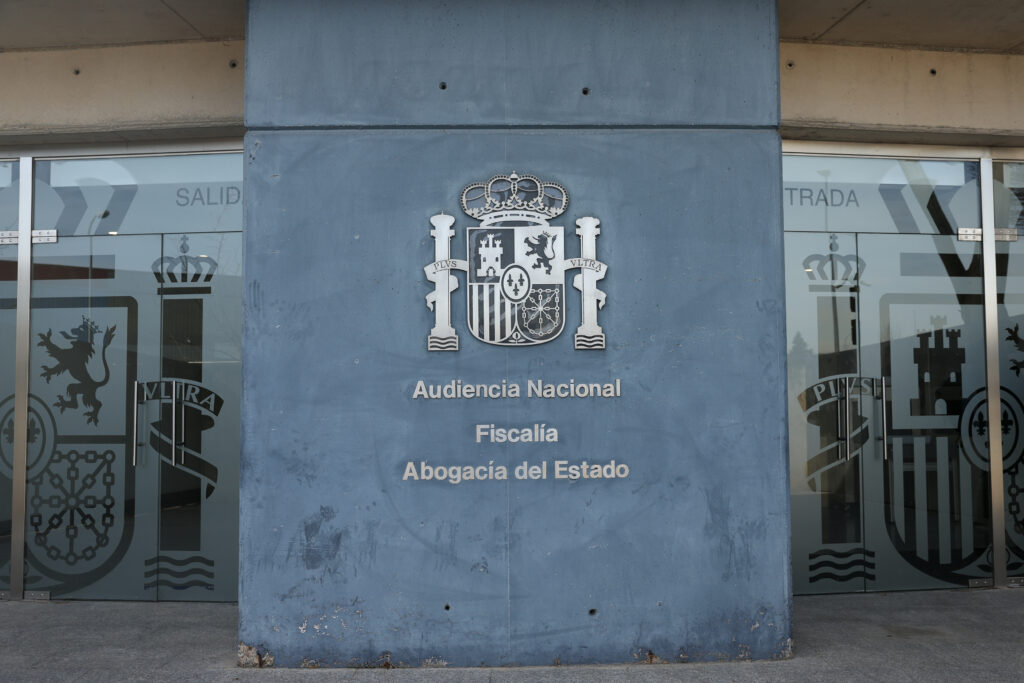
Rubiales sentencing earns praise and consternation
While many are celebrating Thursday's guilty verdict, the Rubiales's punishment sparked differing reactions — namely due to the lack of incarceration time.
Applauding the outcome was Spain’s minister of equality Ana Redondo, who tweeted, "When there is no consent, there is aggression, and that is what the judge certifies in this sentence."
On the other hand, the Federation of Progressive Women, a Spanish nonprofit that fights for gender equity, said the minimal sentencing sparked "deep disappointment."
"It has a deactivating effect on complaints from women who suffer #sexualviolence, reinforces distrust in the judicial system, and strengthens aggressors."
Ex-Spanish football federation president Luis Rubiales is officially on trial for forcibly kissing striker Jenni Hermoso during the 2023 World Cup trophy ceremony, with Hermoso taking the stand on Monday.
"I felt disrespected," Hermoso told the Spanish court. "I think it was a moment that stained one of the happiest days of my life."
"My boss was kissing me, and this shouldn't happen in any social or work setting."
Hermoso describes coercion efforts by Rubiales during trial
Though he denies the charges, Rubiales is on trial for sexual assault as well as for attempting to coerce Hermoso into telling the public that the kiss was consensual.
"I didn't hear or understand anything," Hermoso said about the moment Rubiales assaulted her. "The next thing he did was to grab me by the ears and kiss me on the mouth."
Hermoso testified that Rubiales asked her to record a social media video with him on the flight home from Australia to essentially exonerate him in the public eye.
"I said no," Hermoso told the court. "I was not going to do anything, that I was not the cause of this."
Three other men, including the team's former head coach Jorge Vilda, are also on trial for their attempts to force Hermoso into publicly supporting Rubiales in the incident's aftermath.
The trial is expected to last 10 days, with other high-profile witnesses — including some of Hermoso's World Cup teammates — scheduled to take the stand.
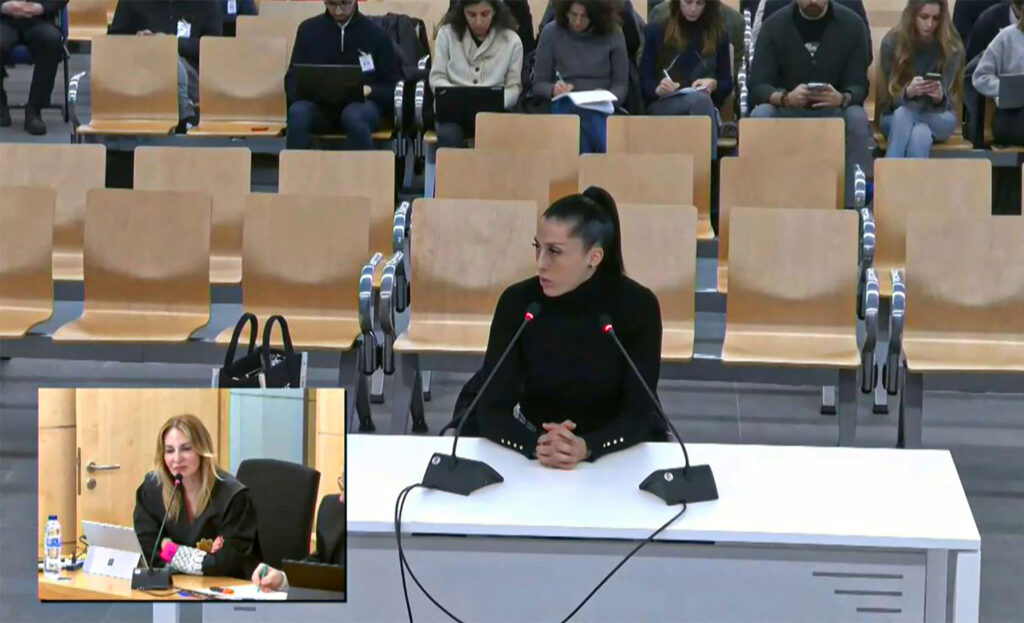
Rubiales faces possible prison time
According to Spanish law, Rubiales faces up to four years in prison if convicted for both charges.
That said, prosecutors are pushing for a sentence of two-and-a-half years (one for the assault and one-and-a-half for coercion). They are also asking the court for €50,000 in damages and a permanent ban on Rubiales from ever serving as a sports official again.
Intense pressure forced Rubiales to resign as the federation's president three weeks after the assault, and he's currently serving a FIFA-imposed three-year ban from soccer that is set to expire in 2026.
Notably, Spanish law has an often-employed buy-out clause for convicted criminals with sentences under two years, meaning Rubiales could avoid incarceration by paying increased damages if the court hands him a sentence of less than 24 months.
As for Hermoso, she explained to the court that public attention from the incident has deeply impacted her life. While her tenure with Liga MX side Tigres allows her an escape from the Spanish media when she's in Mexico, that respite dissipates whenever she returns to Spain.
"I have not been able to really live freely," she told the court on Monday.
After completing a perfect 2023/24 season with Barcelona FC, Spain midfielder Aitana Bonmatí won her second-straight Ballon d’Or award on Monday.
"I always say this is not something that you can do alone," the 26-year-old said, crediting her teammates in her acceptance speech. "I'm so lucky to be surrounded by wonderful players who help me to keep growing into a better player."
Only one other women's footballer has won the award twice: Bonmatí's teammate for club and country, Alexia Putellas, who clocked in 10th in this year's final tally. The two now hold a combined four-year streak in winning soccer's top honor.
The only other recipients in the award's six-year history are USWNT star Megan Rapinoe and Norway's Ada Hegerberg.
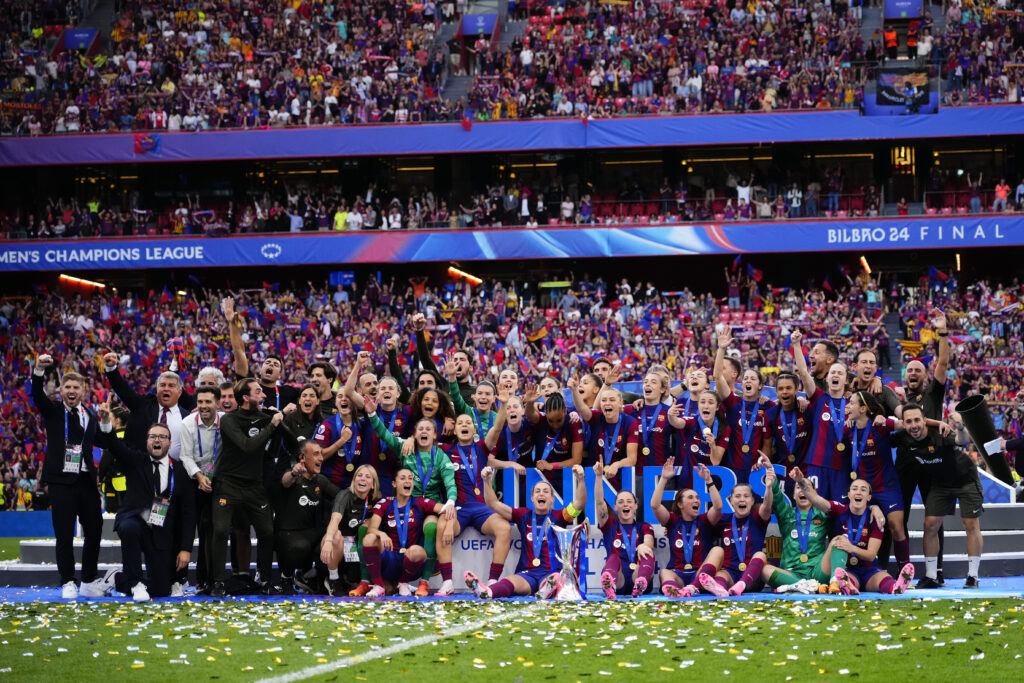
It's Barcelona or bust at Ballon d'Or
Barcelona’s 2024 triumphs — winning a historic quadruple of Liga F, Champions League, Supercopa, and Copa de la Reina titles — earned the team Club of the Year honors last night.
That success was mirrored on the individual level, as well. Barça players owned the award's Top 3 spots, with forwards Caroline Graham Hansen and Salma Paralluelo just behind Bonmatí in the final vote.
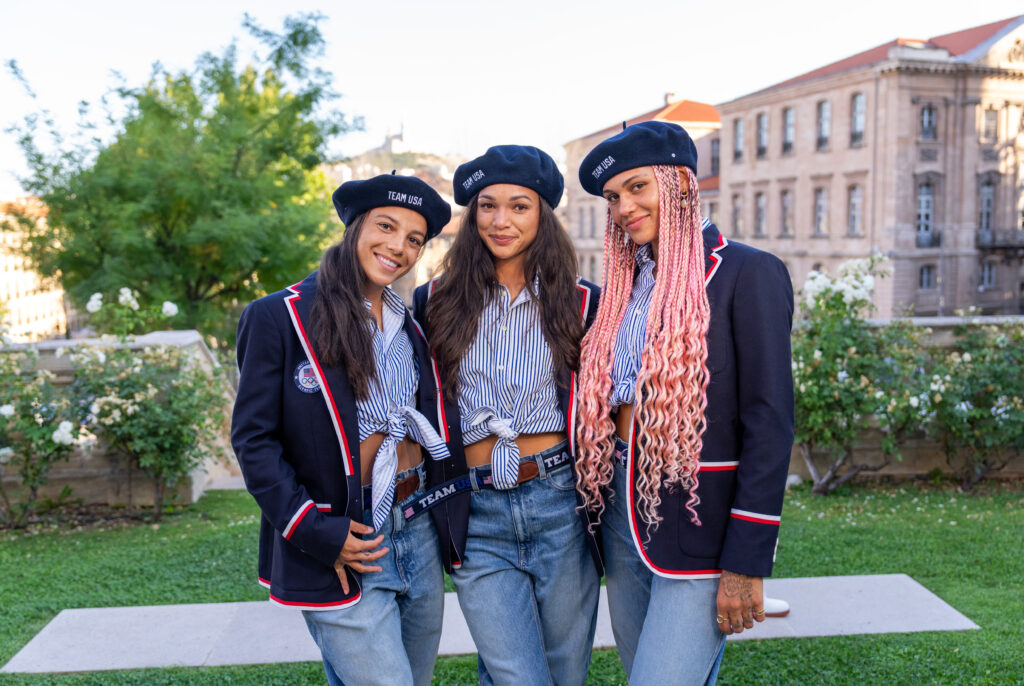
Olympic gold earns USWNT stalwarts votes
Of the five USWNT players on the Ballon d'Or's 30-athlete shortlist, four landed in the Top 10, buoyed by their gold medal performance at the 2024 Paris Games. USWNT captain Lindsey Horan finished at No. 5 alongside the "Triple Espresso" strike squad of No. 4 Sophia Smith, No. 6 Mal Swanson, and No. 9 Trinity Rodman.
The lone goalkeeper on the list, USWNT star Alyssa Naeher, came in at No. 17. The Ballon d'Or does not include a separate individual award for women's football's top goalkeeper.
Meanwhile, USWNT boss Emma Hayes brought home historic hardware of her own.
After leading Chelsea FC to a fifth-straight WSL title before winning Olympic gold with the USWNT, Hayes received the first-ever Women’s Coach of the Year award last night.
"I just want to say a big thank you to all the staff and players from both teams," Hayes said after receiving the inaugural honor.
"Football is a team game and I’m very grateful to have led some amazing teams this year, so this award is for everyone who has been a part of the US team and Chelsea."
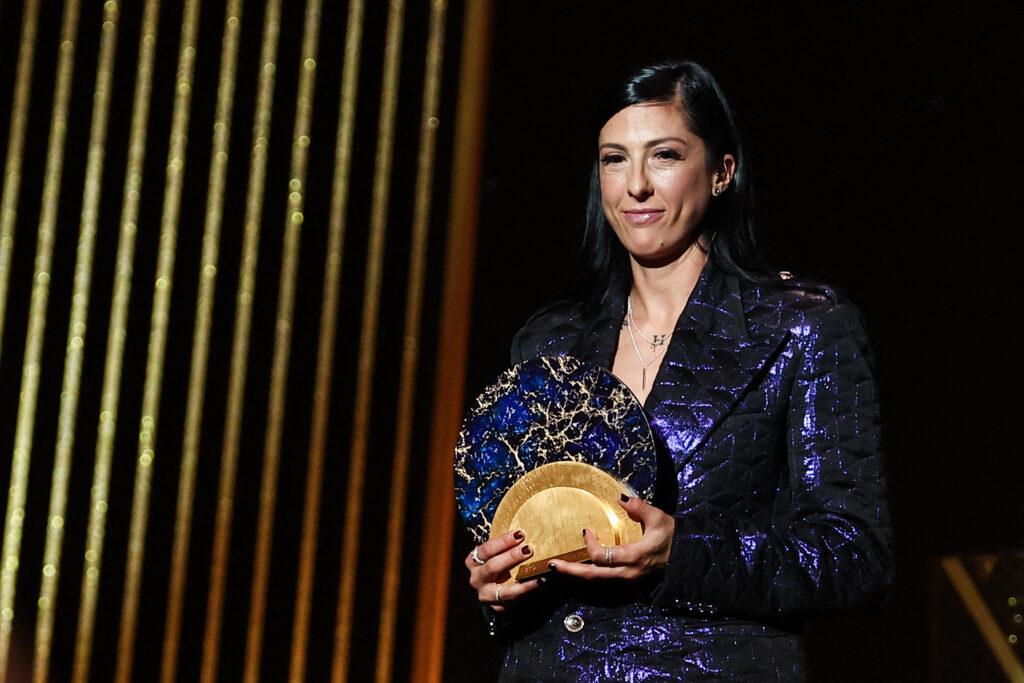
Hermoso's advocacy honored
Former Barcelona forward and Spanish national Jenni Hermoso — who now plays for Tigres in Mexico's Liga MX — became the third person and first woman to win the humanitarian Socrates Award in last night's ceremony.
The award recognizes Hermoso's efforts advocating for the advancement of the women's game, equality at all levels of soccer, and her fight against sexual harassment in sports ignited by the nonconsensual kiss from ex-Spanish federation president Luis Rubiales during the 2023 World Cup trophy ceremony.
"Women's football deserves a place for new and future generations," the 34-year-old urged in her speech before imploring further action from the global soccer community.
"I'd like to ask all of you to get together and work together in order to make a better world possible and to make football become what little girls deserve for the future."

Ballon d'Or ceremony spurs conversation about persisting inequities
While the Ballon d'Or has made strides by instituting a women's football award in 2018, the ceremony continues to be fall during a FIFA women's international window. The scheduling makes it near-impossible for many women's football nominees to attend what is arguably the sport's biggest night.
Last night, only a handful of European-based players were able to make the Paris event.
Even more, the Ballon d'Or ballot only honors one individual woman footballer, while the men's night bestows three additional trophies: the Yashin for best goalkeeper, the Gerd Müller for top goalscorer, and the Kopa for best U-21 player. Plus, while 100 journalists vote for the final men's tally, only 50 are tapped to weigh in on the women's award.
Former Spanish soccer federation chief Rubiales will stand trial on charges of sexual assault and coercion for his unsolicited kiss of Jenni Hermoso after last year's Women’s World Cup final, a judge confirmed this week.
Back in January, Judge Francisco de Jorge recommended that Rubiales be held accountable for his 2023 actions, calling the kiss "unconsented and carried out unilaterally and in a surprising fashion" and within the bounds of "intimacy of sexual relations." On Wednesday, Spain’s National Court ruled that Rubiales should indeed stand trial.
Rubiales has repeatedly denied wrongdoing, saying the kiss was consensual. Hermoso, meanwhile, defined the incident, which occurred during the WWC medal ceremony, as "unexpected and at no time consensual."
Public prosecutors and lawyers for the Spanish Women's National Football Team star and Women's World Cup champion are seeking two and a half years of prison time for Rubiales: one year for sexual assault, and an additional 18 months for participating in coercion.
Rubiales is alleged to have pressured Hermoso into showing support for him following the kiss. Three other officials — including former women's national team head coach Jorge Vilda — are also facing coercion charges that could result in 18 months in prison.
A trial date has yet to be set. Last October, FIFA banned Rubiales from all football activity for three years. The sentence will be in place through the 2026 Men’s World Cup, but will have expired by the time the 2027 Women's World Cup begins.
Spanish player Jenni Hermoso appeared in court on Tuesday to testify in the sexual assault case against former Spanish federation president Luis Rubiales.
Rubiales is named in a lawsuit brought by Spanish state prosecutors, alleging sexual assault and coercion after he kissed Hermoso on the lips without her consent following the 2023 World Cup final. They also say that he tried to convince Hermoso and her relatives to downplay the kiss publicly.
Hermoso’s testimony happened behind closed doors, with Spanish media saying that the forward asked that the appearance be kept as private as possible. She was expected to reiterate to the court that the kiss was unwanted and that both Rubiales and his staff tried to pressure both her and her family into downplaying the incident.
The judge is also hearing testimony from other World Cup-winning players, coaches and federation officials, before deciding whether to take the case to trial. Rubiales has previously denied wrongdoing to the judge, who issued a restraining order against him contacting Hermoso.
Rubiales’ actions at the World Cup – which also included him grabbing his crotch in celebration and “inappropriate” conduct toward England players – sparked international outrage. While he initially refused to resign as president of the RFEF, he later issued his resignation.
FIFA suspended Rubiales for three years, with a report in December showing that the soccer governing body considered more severe sanctions. The report went on to say that the disciplinary committee was satisfied with the three year ban, only with “strong hesitations.”
According to the prosecutors’ office in Madrid, a sexual consent law passed last year could see Rubiales face a fine or a prison sentence of one to four years if found guilty.
Former Spanish soccer federation president Luis Rubiales has been banned from all activities related to the sport for three years, FIFA announced Monday.
The ban comes after Rubiales’ nonconsensual kiss of star midfielder Jenni Hermoso at the 2023 World Cup final. He also threw another Spanish player over his shoulder and was seen grabbing his crotch during Spain’s 1-0 win over England, and his behavior resulted in multiple investigations into his conduct.
While Rubiales initially refused calls to resign, he stepped down on Sept. 10, though he remained defiant in the face of the backlash against him. His decision to resign came after he received a provisional suspension from FIFA, the Spanish government attempted to have him removed and Hermoso filed a criminal complaint against him.
“The FIFA Disciplinary Committee has banned Luis Rubiales, the former president of the Spanish Football Association (RFEF), from all football-related activities at national and international levels for three years, having found that he acted in breach of article 13 of the FIFA Disciplinary Code,” FIFA said in a statement Monday. “This case relates to the events that occurred during the final of the FIFA Women’s World Cup on 20 August 2023, for which Mr Rubiales had been provisionally suspended for an initial period of 90 days.
“Mr Rubiales has been notified of the terms of the FIFA Disciplinary Committee’s decision today. In accordance with the relevant provisions of the FIFA Disciplinary Code, he has ten days in which to request a motivated decision, which, if requested, would subsequently be published on legal.fifa.com. The decision remains subject to a possible appeal before the FIFA Appeal Committee.
“FIFA reiterates its absolute commitment to respecting and protecting the integrity of all people and ensuring that the basic rules of decent conduct are upheld.”
While Rubiales has maintained his innocence, saying the kiss was consensual, Spanish prosecutors have charged him with sexual assault and coercion. They also say Rubiales attempted to put pressure on both Hermoso and her family to say that the kiss was consensual.
Hermoso has maintained that the kiss was not consensual, saying she felt “disrespected” and was left unprotected “as an employee of the federation.”
The 33-year-old midfielder returned to the national team last week for the first time since the World Cup final, scoring the game-winning goal in Spain’s 1-0 Nations League victory over Italy.
Almost all of the players called up to the Spanish women’s national team for its September training camp agreed Wednesday to end their strike after reaching an agreement with their national federation.
More than seven hours of meetings between the players and the Spanish football federation (RFEF) ended with the RFEF saying it would make “immediate and profound” structural changes. Those meetings ended around 5 a.m. local time in Spain.
Of the 23 players selected for the September roster, 21 of them had signed a statement last week demanding action from the federation before they would return to the team. But they still received national team call-ups, and if they refused, they could have faced fines of up to €30,000 and a ban of their federation license for up to 15 years, among other possible sanctions, though officials later said they would not have imposed any sanctions.
While most of the players agreed to play for the national team in the upcoming Nations League matches after the meetings with RFEF, two — Mapi León and Patri Guijarro — decided to leave training camp. Both players were part of “Las 15,” the group of players who refused to play for the national team starting last October and missed the 2023 World Cup.
“They are working on changes. It’s a different situation for us,” Guijarro said. “It’s tough, it’s difficult. Being here, after the way everything has happened, mentally we were not ready to stay. That’s the explanation.”
While the dispute between the players and their federation stretches back to before the World Cup, Spain’s World Cup win on Aug. 20 deepened the divide. Luis Rubiales resigned as RFEF president as a result of the backlash against his forced kiss of star player Jenni Hermoso at the World Cup final, and controversial head coach Jorge Vilda has been fired. Yet those changes “are not enough for the players to feel safe, where women are respected, where there is support for women’s football and where we can maximize our potential,” players said in a statement Friday.
Victor Francos, president of Spain’s national sports council, helped mediate the meetings.
“A joint commission will be created between RFEF, CSD and players to follow up on the agreements, which will be signed tomorrow,” Francos told reporters. “The players have expressed their concern about the need for profound changes in the RFEF, which has committed to making these changes immediately.”
Amanda Gutierrez, president of global players union FUTPRO, said that the meetings are a start of a “long road” for the players and the federation.
“The players see it as a rapprochement of positions. It is the beginning of a long road ahead of us,” Gutierrez told reporters. “Once again, they have shown themselves to be coherent and the vast majority have decided to stay for the sake of this agreement.”
One of the first measures taken is to remove “female” from the women’s national team’s official brand. From this point forward, both the men’s and women’s teams will be known as the “Spanish national football team.”
“Beyond it being a symbolic step, we want it to be a change of concept, and the recognition that football is football, no matter who plays it,” RFEF president Pedro Rocha said.
Spain is set to make its debut in the Nations League against Sweden on Friday, with another match set for Sept. 26 against Switzerland.
Jenni Hermoso, Alexia Putellas and the rest of the Spanish women’s national team will not play for their country until more changes are made within the Spanish football federation (RFEF).
Luis Rubiales resigned as RFEF president as a result of the backlash to his forced kiss of Hermoso at the 2023 World Cup final, and controversial head coach Jorge has been fired. But those changes “are not enough for the players to feel safe, where women are respected, where there is support for women’s football and where we can maximize our potential,” the players said in a statement.
The players are demanding the restructuring of the women’s football organization, the presidential cabinet and general secretary, the communications and marketing department and the ethics and integrity department.
Head coach Montse Tomé, who took over in the wake of Vilda’s firing, is set to announce her first squad Friday. The World Cup champions are set to play in Nations League games against Sweden and Switzerland on Sept. 22 and 26.
“The players of the Spanish team have, at all times, been open to dialogue, seeking to convey clear and well-argued reasons that we believe are necessary to be able to carry out our work at the highest level with the respect we deserve,” the players wrote. “The specified changes to the RFEF are based on zero tolerance for those people who, from a position within the RFEF, have had, incited, hidden or applauded attitudes that go against the dignity of women.”
Before Rubiales stepped down earlier this week, he had vowed not to resign in a meeting of the RFEF. Many in the audience at the meeting applauded Rubiales, though some have since apologized, saying that they felt pressured to do so.
At the time, players said they would not play for Spain again “if the present leadership continues.” They also asked for “real structural changes that help the national team continue to grow.” Though Vilda and Rubiales are out, the players want to see more systemic changes.
“We firmly believe that strong changes are required in leadership positions in the RFEF and specifically, in the area of women’s football,” the players wrote. “We want to end this statement by expressing that the players of the Spanish team are professionals, and what fills us most with pride is wearing the shirt of our national team and leading our country to the highest positions.
“We believe that it is time to fight to show that these situations and practices have no place in football or society, that the current structure needs changes and we do it so that the next generations can have equality in football and at the level that we all deserve.”
#SeAcabó pic.twitter.com/tV49CkOq4F
— Alexia Putellas (@alexiaputellas) September 15, 2023
Alexia Putellas and the rest of the Spain women’s national team are aiming to inspire change beyond soccer as the fallout from their World Cup controversy continues.
Luis Rubiales resigned as president of the Spanish soccer federation (RFEF) earlier this week as the result of mounting pressure from his behavior at the 2023 World Cup final. Following Spain’s 1-0 win over England, Rubiales kissed star midfielder Jenni Hermoso, a gesture which she has maintained came without her consent.
Hermoso’s teammates have stood with her in the wake of the incident, which created an international uproar and has led to multiple investigations into Rubiales.
So when FC Barcelona Femení became the first sports team to win the Medal of Honor from the Catalan parliament, Putellas used the platform to call attention to their fight for change.
“We are the first men’s or women’s team to be distinguished with this Medal of Honour — this would have been unthinkable five, 15, 20 years ago, but it has happened,” she said in her acceptance speech Wednesday. “This has not been achieved from scratch, so I would like to thank all those pioneers who, before our arrival, promoted women’s sport at Barca or in other organizations. This medal also belongs to them, we are very aware of that.”
Launched in 2000, previous winners include recipients of the Nobel Peace Prize, former presidents and soccer manager Pep Guardiola, the only previous winner related to sport.
Barcelona received the award for their success as four-time Spanish league winners and two-time Champions League winners, but also because of the impact that they have had on sport in Catalonia. Twice, the team has filled Camp Nou and broken women’s attendance records.
“At Barca, we are helping to build a fairer, more equal society with more opportunities through football. Our efforts and our victories are making us a point of reference for many children, young people and adults,” Putellas said. “Our commitment to women’s sport and society is unquestionable, but we need more help to keep growing, so that this is not just a fad. And here, if I may, I would like to demand more support for women’s football, more and better facilities, more pitches and more investment at grassroots level.”
Noting that women in sports are “here to stay,” Putellas also noted a commitment to “help those that come after us.”
“There is still a long way to go, as we are seeing these days with the serious situation we are facing with the [RFEF] and the changes we are all asking for so that no woman, inside or outside football, ever has to live a situation of disrespect or abuse,” she said.
“We need consensus, courage and leadership from the institutions. We will not stop here. Those who fought before us deserve it, we deserve it for the effort we make every day and all the girls and boys who today dream of being like us deserve it. We will not fail you.”
Putellas: "Estamos aquí para quedarnos, para ayudar a las que vendrán, porque todavía queda mucho camino por hacer. Estos días lo hemos vivido con esta grave situación. Ninguna mujer tiene que vivir nunca más faltas de respeto o abuso. No vamos a parar" https://t.co/pcmOsXnuls pic.twitter.com/WcAxrfxhQo
— EL PAÍS (@el_pais) September 14, 2023
Lindsey Horan is the lone U.S. women’s national team player to receive a nomination for the 2023 Best FIFA Women’s Player award.
The 29-year-old co-captain scored two goals for the USWNT at the 2023 World Cup, tied with the team’s lone Ballon d’Or nominee Sophia Smith. No other U.S. player scored a goal at the tournament in Australia and New Zealand. Horan also starts in midfield for French club Lyon in Division 1 Féminine.
Alexia Putellas, who won the 2021 and 2022 Best Player awards, is notably absent from the 2023 list after spending the last year recovering from an ACL tear. Beth Mead and Alex Morgan, the runners-up for the 2022 award, also failed to make the cut. Mead has been out since December 2022 with an ACL tear.
World Cup champion Spain counted four nominees, including Aitana Bonmati, who won the Golden Ball at the World Cup, as well as Jenni Hermoso, Mapi Leon and Salma Paralluelo.
England tied Spain with four nominees, with Rachel Daly leading the way. Alex Greenwood, Lauren James and Keira Walsh also are nominated.
Australia star Sam Kerr received a nod, and she is joined by two fellow Matildas in Caitlin Foord and Mary Fowler. Colombia’s Linda Caicedo, France’s Kadidiatou Diani, Sweden’s Amanda Illestedt and Japan’s Hinata Miyazawa, the World Cup Golden Boot winner, round out the nominees.
Nominees for the Best Coach award include England’s Sarina Wiegman, who won the award last year, Australia’s Tony Guastavsson and Sweden’s Peter Gerhardsson. Two club coaches also received nominations: Chelsea’s Emma Hayes and FC Barcelona’s Jonatan Giráldez.
England’s Mary Earps is once again nominated for Best Goalkeeper and is looking to win the award in back-to-back years. She’s joined by Mackenzie Arnold (Australia), Ann-Katrin Berger (Germany), Christiane Endler (Chile), Zecira Musovic (Sweden), Catalina Coll (Spain) and Sandra Paños (Spain).
Presenting #TheBest FIFA Women's Player Nominees 🏆🎉
— FIFA Women's World Cup (@FIFAWWC) September 14, 2023
🇪🇸 Aitana Bonmati
🇨🇴 Linda Caicedo
🏴 Rachel Daly
🇫🇷 Kadidiatou Diani
🇦🇺 Caitlin Foord
🇦🇺 Mary Fowler
🏴 Alex Greenwood
🇪🇸 Jennifer Hermoso
🇺🇸 Lindsey Horan
🇸🇪 Amanda Ilestedt
🏴 Lauren James
🇦🇺 Sam Kerr
🇪🇸 Mapi Leon
🇯🇵…